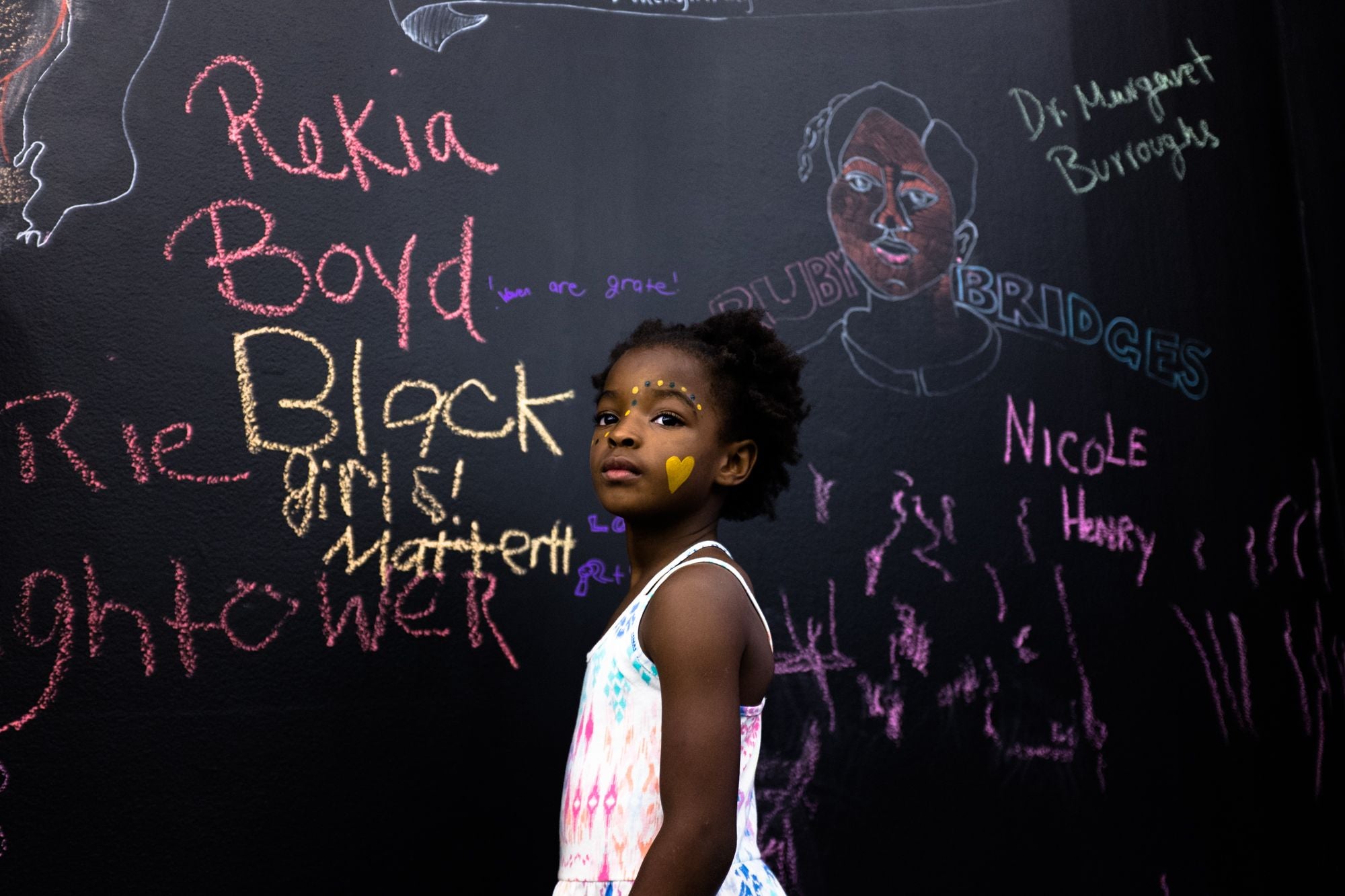Fifty-seven years ago, just over two weeks after the historic March on Washington, four Black girls—Addie Mae Collins, Denise McNair, Carole Robertson, and Cynthia Wesley—were murdered by a Ku Klux Klan member who bombed the 16th Street Baptist Church in Birmingham, Alabama. Their tragic deaths further galvanized the Civil Rights Movement, ultimately leading to the passage of the Civil Rights Act of 1964, which outlawed discrimination based on race, color, religion, sex, or national origin.
Despite this landmark legislation, it would take almost half a century for the bomber, Thomas Blanton Jr., to be found guilty, and for these girls and their families to have any semblance of justice. Decades later, millions of Black girls and young women are still being denied justice.
In 2013 and 2014, both trials against the Detroit police officer who shot and killed seven-year-old Aiyana Stanley-Jones in her grandmother’s home ended as mistrials. Not one single arrest has been made in the case of Breonna Taylor, the 26-year-old African-American emergency room technician who was fatally shot eight times by Louisville police in her home shortly after midnight on March 13, 2020. And like Sarah Collins, the fifth little girl who survived that monstrous bombing in Alabama, many other Black girls are simply forgotten.
At this very moment, Black Lives Matter has emerged as our nation’s largest political movement and racial justice is receiving unprecedented philanthropic support. And yet, Black girls and young women still remain adultified, victimized by violence, and erased from the very same social justice movement for which they continue to risk their lives.
We, Black women and Femme activists, artists, educators, organizers, and philanthropists, have come together at the historic time to call attention to the fact that Black girls in the United States are in crisis. From discrimination in education and healthcare to sexual assault and policing, the lives and livelihoods of Black girls and young women are notably absent in the public narratives, policies, and justice movements most crucial to addressing inequality and racial trauma.
They face significant barriers to educational achievement, economic and political equity, and are the recipients of deeply embedded racial and gender biases in the media, public policy, research, and philanthropy. According to the Ms. Foundation landmark study on philanthropy, women and girls of color account for 0.5% of $66.9 billion by foundations, totaling just $5.48 per woman and girls of color in the United States.
This needs to end NOW.
We believe that by investing $1 Billion in Black girls and young women over the next decade, we can make the biggest change possible. We know that all social justice efforts benefit when we place value in Black girls’ and women’s lives and leadership.
Our collective futures depend on it.
Black girls are more likely than girls of any other race to see themselves as leaders in their homes and communities. Despite underinvestment in their power as changemakers, 48% of Black girls agree with the statement: “I am a leader,” according to Girls Leadership’s Ready to Lead report. In practice, Black girls and young women continue to put themselves at risk on the front lines of racial and gender justice movements and devise strategies to organize across identities and communities to advance justice for all of us.
Eventually, Black girls become Black women and Black girls’ leadership becomes Black women’s leadership. Black women are the most civically engaged racial group and power players shaping our politics and labor force. They are starting small businesses at a higher rate than any other racial group, and in the 2018 midterm election cycle, there were a record number of Black women running for office. These gains have been made in spite of Black women leaders being grossly underfunded, under-resourced, and underestimated.
The tools and tactics that have justified structural violence against Black women and girls are being used to subjugate all of our communities. Black women’s and girl’s voices, visions, and experiences are essential and necessary for the liberation of all Black people.

It is clear that, with intention and investment, Black girls can thrive. Imagine what 2030 will look like if there is a significant investment made in the lives and livelihood of Black girls now and if the 48% who know they are leaders became 100%. We call on you to robustly invest in Black girls and women’s leadership, innovation, wellness, advocacy. This support is necessary for our collective freedom and to ensure that all Black Lives Matter, now and tomorrow.
Invitation to pledge
1Billion4BlackGirls is a 10-year philanthropic initiative designed to invest in the brain trust, innovation, health, safety, education, artistic visions, research, and joy of Black girls and their families. For far too long, Black girls have shaped our democratic process and cultural legacy without an expectation of return. We invite you to commit to their leadership by investing in the 1Billion4BlackGirls today.
CO-FOUNDERS OF THE BLACK GIRL FREEDOM FUND
Monique W. Morris, Grantmakers for Girls of Color
LaTosha Brown, Southern Black Women and Girls Consortium
Tarana Burke, ‘me too.’ Movement
Fatima Goss Graves, National Women’s Law Center
Joanne N. Smith, Girls for Gender Equity
Salamishah Tillet, A Long Walk Home
Scheherezade Tillet, A Long Walk Home
Teresa C. Younger, Ms. Foundation
CONFIRMED SUPPORTERS
Ciara
Akira Barclay
Beverly Bond
Karen Boykin-Towns
Camille A. Brown
Sherrese Clarke Soares
Felicia Davis
Marley Dias
Jessyca Dudley
Kamilah Forbes
Melissa Harris-Perry
Valerie Jarrett
Alice Jenkins
Janice Johnson Dias
Luvvie Ajayi Jones
Rashida Jones
Jane Kimondo
Ashley Leonard
Nakisha Lewis
Felecia Lucky
Tynesha McHarris
Margo Miller
Heather D. Parish
Angelique Power
Angela Robinson
Cidra M. Sebastien
Jurnee Smollett
Gabrielle Union
Whitney Wade
Damaris Walker
Ada Williams-Prince

